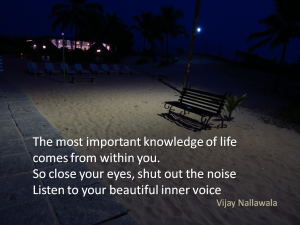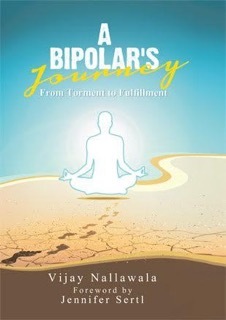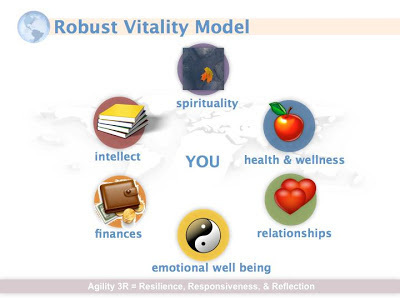A culture is made -- or destroyed -- by its articulate voices. Ayn Rand
The culture being cultivated in India is one of vitality, authenticity, and compassion. One important voice in this culture is Vijay Nallawala. Vijay took time to put his life experience onto paper -- and is now allowing his life experience to guide his life.
In his memoir, A Bipolar's Journey From Torment to Fulfillment, what allowed him to be so brave and personal is the belief that his honesty would free other people to share their experience and make mental illness less taboo of a topic in his community. His premise was that if more people talk about the illness more people will get the help they need, be more likely to stay on medication and be more likely to find and keep work to support their livelihoods. The clarity of his mission has hit a primal cord and momentum is rising. So much so that March 30th is World Bipolar Day launching in Mumbai.
This is a victory not just for Mumbai, but for us all.
The statistics on mental illness vary, and if you want a deep dive in numbers, World Health Organization has a lot of global statistics on mental illness and the economic impact of the disease. I am the daughter of a beautiful and talented woman with schizophrenia. Her illness taught me so much about resilience, compassion, and perspective. Choosing to be vocal about her disease feels important.
Unlike cancer survivors wearing a band to signify their strength, resilience, community and triumph, there is no such zeitgeist for those who are struggling with mental illness.
Talking about it is taboo, because no one likes the idea that perception is not fixed. We like the idea that there is one reality and what we all see, feel, and experience is "real." Yet, we know that many aspects of reality are subjective. We are afraid of the disease because we are afraid to admit that we might not be able to trust our own judgment. We are mirrors for one another. We want to know we are "right" or have the most accurate lens of reality.
Being around people suffering from mental illness causes us to look in the mirror and question our sense of "what is right" and "what is true."
We are afraid of the disease because we are afraid of the loneliness that occurs when we have a family member suffering from mental illness and there is so much shame associated with it. No one in the family wants to talk about it. Many try to become extraordinarily competent and over functioning to ensure no one sniffs under the hood to see how broken, scared and fractured the family really is. Everyone has doubts, fears, concerns, mood swings. Fear of extremes causes people to mitigate and mute what is natural, and accidental consequences occur. People also want to point a finger and find out who is to blame for the illness or who caused the behavior. The idea that human behavior is caused by how specific hormones respond to synapses in the brain feels so simplistic and reduces humanity to a chemistry factory. We as human beings want to feel more special than hormones, neuroscience and the laws of physics.
We are human, all too human. We are chemistry factories, all too chemistry.
That is why the step forward Vijay Nallawala is taking is so significant. His choice to share his story is not only cathartic for him and his family -- it is cathartic for all of us touched by mental illness in any way. He has taken an ice axe and severed the stigma. Families, especially in India, no longer have to fear being judged, marginalized and excluded because of their association with the disease. The disease has less power over us if we find ways to talk about it, learn about it, share our stories and find our voices.
You have heard me say before and I'll say it again that our competitive advantage is the accuracy in which we scan/interpret the environment and how we make decisions. We all need better habits to strengthen and fortify our own vitality.
Here is a the A3R robust vitality model:
Each of these aspects contributes to your sensory system's ability to stand tall, see clearly, receive feedback, and have energy to focus. You can take each of them to deeper levels of specificity and intensity:
Spirituality: knowing that your life makes a difference to others
Health: eating balanced, exercising, getting sleep, and proper testing
Relationships: ensuring you have a confidant, friends and intimacy
Emotional Well Being: honoring your talent without pride; inadequacy without shame
Finances: mindful spending, saving, giving
Intellect: strengthening skill for today, skill for tomorrow, and collaboration capability
Each of these attributes contributes to your sensory system's ability to stand tall, see clearly, receive feedback, and foster self-esteem.
I would like you to put in your smartphone or some calendar app to review this dashboard at least once per quarter and make a choice on where addition time/energy can enhance better balance.
An individual that honors their mind, body, spirit is going to be more accurate in their macro scan, add more value to their family, community and workplace.
Cheers to Mumbai and World Bipolar Day.
Perhaps the best way you can celebrate is to practice self-care.
To your vitality,
Jennifer
PS: Here are some links that I reference frequently to re-calibrate and ensure optimal mental vitality...
1) #vitality: Harvard Business Review quantitatively shows how sleep deficit is a performance killer
2) #vitality: Why do smart people under-perform? Overloaded circuits!
3) #vitality: Brene Brown has a terrific message for those seeking to honor their authentic voice. The power of vulnerability
4) #vitality: Financial stress can impact our families, our health and our personal stability. New York Times recently did a comprehensive piece all about our spending habits. Why We Do What We Do
5) #vitality: An antidote to spending is looking at what we value and why. I find philosopher Tim Rayner's voice to be useful. See Like a Stoic -- an ancient technique for modern consumers
6) #vitality: How much money do you need to be happy? It depends what it means to you. Minda Zetlin in Inc. Magazine asks some valuable questions.
7) #vitality: Business strategist Eric Best has created a framework for individuals to revisit their current activities against their long view. I often revisit these Four Principles to Guide A Life.
8) #vitality: In the midst of macro seduction -- keeping a journal is a powerful way to ensure your own voice is not drowned by other's noise. Here are some personal practices that I have found invaluable to my journey. Hold On To Your Core.
9) #vitality: Building personal resilience is important in an era where there is so much complexity. Here are some suggestions on Building Resiliency.
10) #vitality: Just as bones need pressure to build calcium, we need to grow in our jobs and in our work in order to feel valuable and stay relevant. Institute for the Future has created a robust landscape of some essential skills for the digital age.



